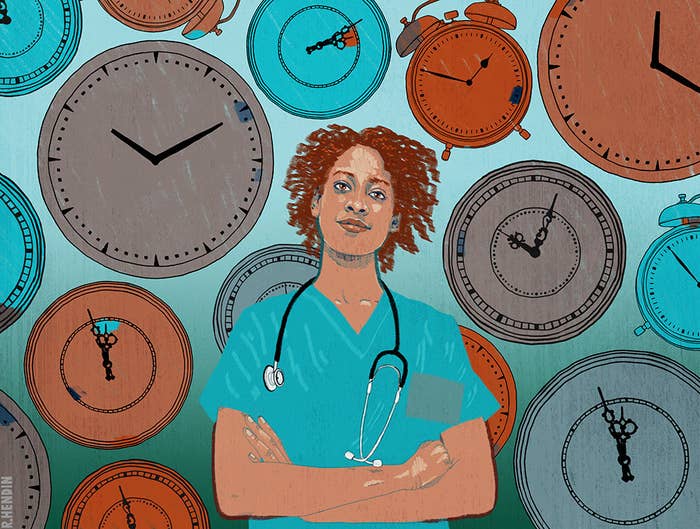
The government's proposed plans to replace a bursary for student nurses, midwives, and allied health professionals (AHPs) with loans has sparked fierce debate in parliament.
The Department of Health has said a loan system will help to fund thousands more training places, thus tackling staff shortages in the NHS, and create a fairer system that brings nurses, midwives, and AHPs into line with other students.
But the nursing community has said the prospect of leaving university with debts exceeding £50,000 will deter new students from training, while those who do choose to take on the course, much of which involves on-the-job training, will essentially find themselves paying to work.
A third-year student nurse who wished to remain anonymous told BuzzFeed News exactly what a typical day on her placement in hospital is like and the lengths she is already going to to stay on top of her studies:
"Today I worked a 12.5-hour shift and had a one-hour break.
"My mentor – a qualified nurse – and I were allocated six patients to look after, although I ended up seeing around 15 patients after answering call bells and helping out other nurses on the ward.
"When you also take into account social workers, family members, and friends of patients we meet – also a huge part of the job – we work closely with a vast amount of people every day.
"I spent most of the morning helping patients with personal care such as washing, dressing, and generally getting them comfortable.
"Sometimes people aren't able to feed themselves when they're in hospital, so I will help them with that too. Nutrition is so important for recovery and you have to be sensitive to how a person feels and try to get to know them. They have to be able to trust you.
"Today I fed a man with dementia who didn't really understand what the food was, let alone why there as some random person sitting next to him and putting a spoon in his face.
"I always try to think, How would I want my grandad or mum or any member of my family to be treated? You just have to take your time and try to find a way to explain what's happening to them in a way they can understand.
"I try never to rush a patient, which with so few nurses to so many patients can be very hard sometimes. But I try not to think of it as a challenge – you have to just get on with it and do what you can, even when you have about 3 million other things to think about.
"Everything on a placement is a learning exercise, so for every pill that's given out, or injection done, my mentor asks me to name the medication and its purpose, side effects, and the correct dosage, and for every procedure, they ask me to explain the rationale behind doing it. Before lunch, I assisted a nurse with inserting a catheter, learning a special non-touch technique, and administered medications, something I did twice more by the end of the day.
"When you study history, you study history, but with nursing you're not just learning one thing. There's pharmacology, psychology, sociology, and you have to be so focused. If you have a good mentor – and mine is amazing – they will constantly question you to help you learn, so we work very, very hard.
"I managed to eat some macaroni cheese on my break, which helped keep me going (that and six cups of coffee!), but your break isn't a proper break because it's often the only time you have to catch up with studying. If there's something I don't know when I'm on the ward, I'll write it down, and then on my break spend time looking up what's in my notebook so I can ask my mentor more about it later. You just don't get a chance otherwise.
"I'm struggling with also having my dissertation to write, and I have to work a part-time job one day a week. It's nonstop.
"After lunch, my mentor and I looked through some patient results together (more science to interpret and questions to answer).
"The results aren't always good. I am on a liver ward with a lot of alcoholics, and one woman who isn't even 30 is dying of liver failure. I'm 29, and seeing someone of my age at the end of their life is utterly heartbreaking. She knows she's dying, but it's too late.
"A lot of people I help treat are in very difficult social situations. On my A&E placement I often saw the same homeless people come in and out of hospital because they've had nowhere else to go. I have met countless elderly patients who have had a stroke and ended up on the floor for days before someone has found them, because they've not had access to a carer at home.
"Working out social care for people leaving hospital is very challenging, as social services are as stretched as we are. Between the nurses and social services, we're being ripped apart.
"Nursing is tough and seeing people have their lives changed forever, for better or worse, is emotionally challenging sometimes.
"But it's also the best job in the world, and I feel privileged to be there to help people at the most vulnerable times of their lives. We're so lucky to have to the opportunity to care for them, and to make a difference to them.
"Taking away the bursary to let more new nurses train means that students are going to have to get into more debt to help patients and help the people around them. It doesn't really add up."
